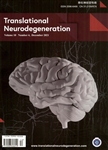Kallikrein-related peptidases 6 and 10 are elevated in cerebrospinal fluid of patients with Alzheimer’s disease and associated with CSF-TAU and FDG-PET
作者机构:Department of Psychiatry and PsychotherapyKlinikum rechts der IsarTechnical University of MunichSchool of MedicineIsmaninger Str.2281675 MunichGermany Department of Nuclear MedicineTUM-NICKlinikum rechts der IsarTechnical University of MunichSchool of MedicineIsmaninger Str.2281675 MunichGermany Department of Obstetrics&GynecologyKlinikum rechts der IsarTechnical University of MunichSchool of MedicineIsmaninger Str.2281675 MunichGermany Department of Pathology and Laboratory MedicineMount Sinai Hospital60 Murray St.TorontoOntario M5T 3L9Canada Department of Laboratory Medicine and PathobiologyFaculty of MedicineUniversity of TorontoMedical Science Building1 King’s College CircleTorontoOntario M5S 1A8Canada Department of PsychiatryUniversity hospital of RionUniversity of Patras26500 Rion PatrasPatrasGreece
出 版 物:《Translational Neurodegeneration》 (转化神经变性病(英文))
年 卷 期:2019年第8卷第1期
页 面:304-316页
核心收录:
主 题:Alzheimer’s disease(AD),Kallikrein-like peptidase(KLK),KLK6,KLK8,KLK10,Cerebral amyloid load,Cerebrospinal fluid(CSF),Amyloid 1-42 Aβ1-42 Aβ42,Tau protein,Total tau,tTau,Phospho tau,pTau,Positron emission tomography(PET)
摘 要:Background:Alterations in the expression of human kallikrein-related peptidases(KLKs)have been described in patients with Alzheimer’s disease(AD).We elucidated the suitability of KLK6,KLK8 and KLK10 to distinguish AD from NC and explored associations with established AD ***:KLK levels in cerebrospinal fluid(CSF),as determined by ELISA,were compared between 32 AD patients stratified to A/T/(N)system with evidence for amyloid pathology and of 23 normal controls with normal AD *** between KLK levels and clinical severity,CSF and positron emission tomography(PET)based AD biomarkers were tested ***:Levels of KLK6 and KLK10 were significantly increased in ***6 differed significantly between AD A+/T+/N+and AD A+/T−/N+or NC with an AUC of *** pTau and tTau levels were significantly associated with KLK6 in ***:KLK6 deserves further investigations as a potential biomarker of Tau pathology in AD.



